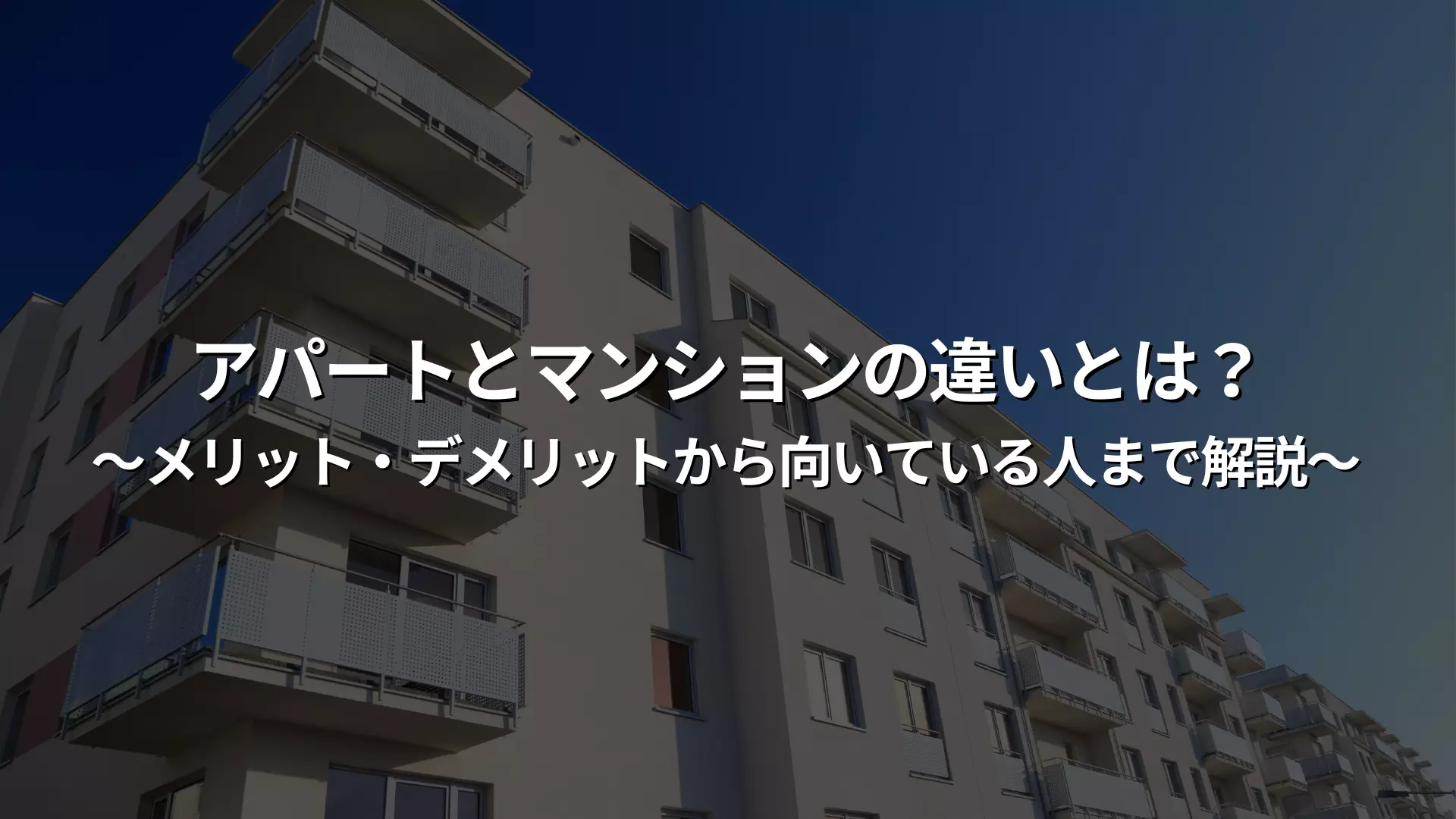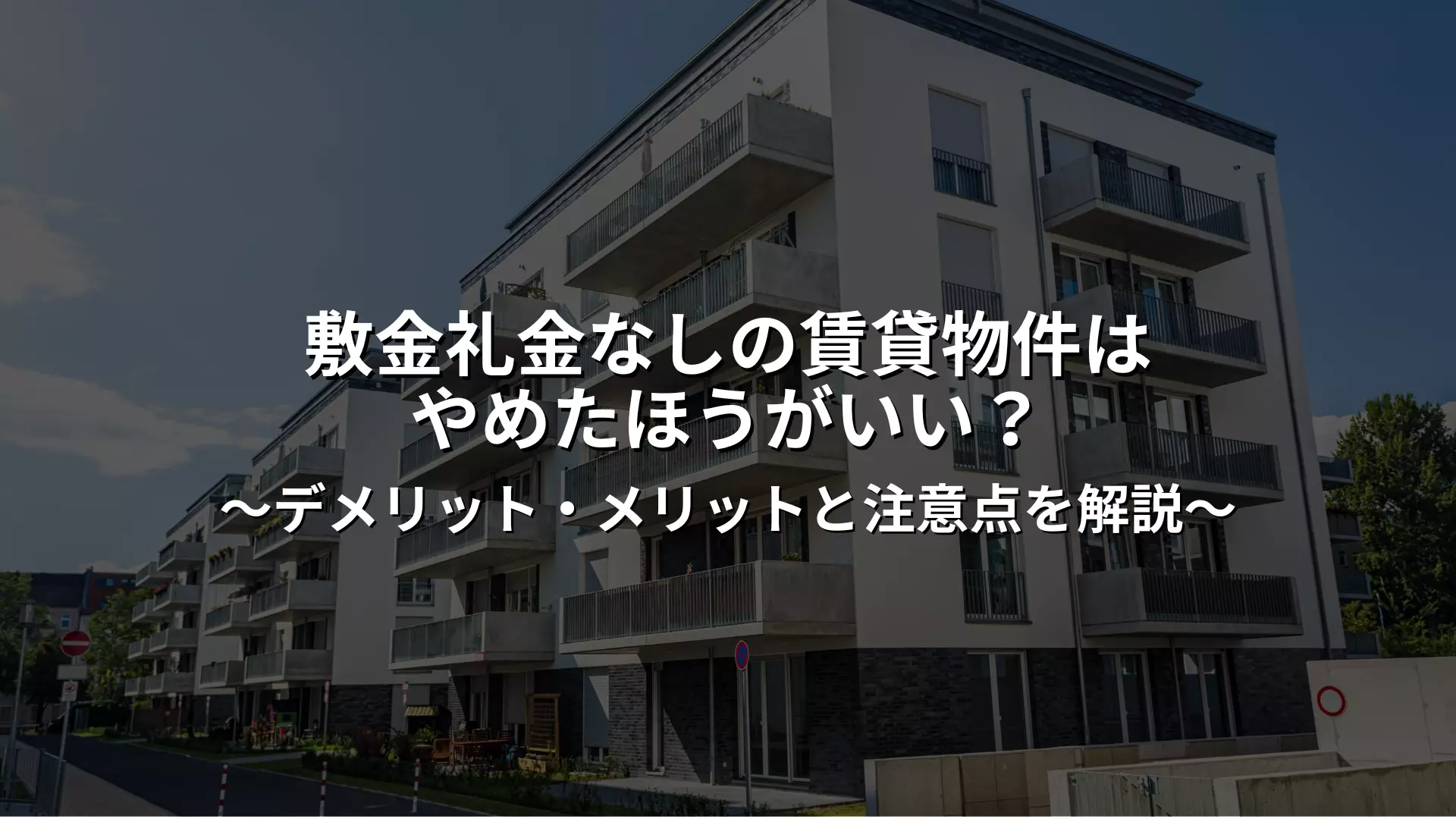Comparing the differences between apartments and condominiums: What are the differences in structure, materials, and names?
Although apartments and condominiums may seem to differ in appearance, comfort, and facilities, there is actually no clear legal distinction between them. In the real estate industry, they are distinguished by the structure, number of floors, construction materials, etc.
Below, we'll explain the differences between the two in an easy-to-understand way and take a closer look at how each name was decided.
Is there no clear legal definition? In fact, the distinction is vague
There is no clear legal definition of the terms "apartment" and "condominium" in Japan.
Under laws such as the Building Standards Act, both are classified as "shared housing," so legally they are treated the same. Therefore, the image that "mansions = luxury and sturdy" and "apartments = cheap and simple" is merely a general impression and a convention within the real estate industry.
In reality, in most cases, buildings are named "mansions" or "apartments" based on their structure and facilities, so it is important to be aware that there are no unified standards when choosing a property.
They are roughly classified according to structure, number of floors, and building materials.
In general, apartments and condominiums tend to be classified according to their structure, number of floors, and building materials used.
Wooden or light steel-framed buildings with two stories or less are often called "apartments," while reinforced concrete (RC) or steel-reinforced concrete (SRC) buildings with three stories or more are often called "mansions."
This difference also affects housing performance such as earthquake resistance, soundproofing, and insulation, so when choosing a property it is extremely important to check the structure rather than judging solely by appearance.
The name may differ depending on the judgment of the real estate company or landlord.
The name of the property is not necessarily determined based on the structure or number of floors. In reality, depending on the marketing intent of the real estate company or landlord, an "apartment" may be advertised as a "XX condominium" or vice versa.
For example, even if the property is a two-story wooden building, it may be labeled as an "apartment" to give it a luxurious feel. Judging the specs of a building based on the name alone can be misleading, so when choosing a property, be sure to check the structure, age, and facilities.
What are the advantages and disadvantages of apartments?
Apartments are a popular type of rental property for first-timers living alone or those who are cost-conscious, due to their low rent and easy location selection. On the other hand, they may be inferior to condominiums in terms of soundproofing and earthquake resistance.
Here, we will summarize the advantages and disadvantages of living in an apartment and also explain in detail what type of people it is suitable for.
Benefits of living in an apartment: Low rent, good ventilation, quiet environment
The biggest advantage of apartments is that the rent is relatively cheap and it is easy to keep initial costs down. Because they are made of wood or lightweight steel, construction costs are low, which is reflected in the rent.
In addition, the highly breathable structure prevents moisture from building up, making it a comfortable living environment for people who like good ventilation. Many of them are located in suburban and residential areas, and another attraction is that they offer a quiet and peaceful life. Some properties have large parking spaces, making it easy to live comfortably.
Disadvantages of living in an apartment: concerns about soundproofing, durability, and security
Due to their structure, apartments tend to have lower soundproofing than condominiums. Especially in wooden or lightweight steel-framed buildings, noise from daily life in the rooms above, below, or next door can easily echo, which can cause noise problems.
In terms of earthquake resistance and fire resistance, they may be inferior to apartments made of reinforced concrete or steel reinforced concrete. Furthermore, many properties do not have security equipment such as auto-locks or surveillance cameras, which may be a cause for concern for those concerned about crime.
When choosing, it is important to check not only the layout and facilities but also the structure.
Who is an apartment suitable for? Cost-conscious people, people new to living alone, etc.
Apartments are especially recommended for people who want to keep rent as low as possible, as well as students and new graduates who are living alone for the first time. Many properties come equipped with the bare minimum while keeping living costs down, making them ideal for a simple lifestyle.
It is also suitable for those who are considering short-term residence or who prefer the quiet environment of a residential area. On the other hand, those who are sensitive to noise and security should consider carefully. Choosing the right conditions for you based on your budget and lifestyle is the key to success.
Search for a room
Only furnished properties with appliances are listed!
What are the advantages and disadvantages of apartments?
The appeal of condominiums is that they are soundproof and earthquake-resistant, and come with a full range of facilities such as auto-locks and delivery boxes. On the other hand, rent and management fees tend to be higher than for apartments.
Here, we will summarize the main advantages and disadvantages of apartments and also explain in detail what type of people they are suitable for.
Benefits of an apartment: Soundproofing, earthquake resistance, and comprehensive facilities
Condominiums are often built with reinforced concrete (RC) or steel-reinforced concrete (SRC), and are better at soundproofing and earthquake resistance than apartments. Their greatest appeal is that they are less susceptible to everyday sounds and provide peace of mind in the event of an earthquake or fire.
In addition, many properties come equipped with shared facilities such as elevators, auto-locking doors, delivery boxes, security cameras, etc., making it an ideal living environment for those looking for comfort and convenience. The abundance of facilities greatly increases the satisfaction of living in the property.
Disadvantages of living in an apartment: High rent and maintenance fees, condensation, etc.
The disadvantage of apartments is that the rent tends to be set higher because of their high performance, and management fees and common area fees are also required every month. These fees are used to clean the common areas and maintain the facilities, but those who do not use the apartment often may feel that the costs are expensive.
Also, because of its airtight structure, condensation is likely to occur in the winter, so it is important to take measures against mold and ventilation. It is also important to be aware of the pitfalls of high performance.
People who are suitable for apartments: People who value security and comfort
Apartments are ideal for people who want to live in a quiet environment and feel secure in terms of soundproofing and security. They are especially recommended for people who work from home and spend a lot of time at home, people who are sensitive to noise, and people who want to live comfortably in a well-equipped home.
In addition, it is also suitable for women who are highly security-conscious and live alone, and properties with shared facilities and a well-established management system provide peace of mind. It is the best choice for those who value quality of life, even if it costs a little more.
Differences between the two in terms of soundproofing, earthquake resistance, and security
When comparing apartments and condominiums, many people are concerned about soundproofing, earthquake resistance, and security. These performance factors vary greatly depending on the structure and facilities, and are directly related to the comfort and safety of daily life.
Here, we will clearly explain the differences based on the specifications of the buildings and organize them to serve as a reference when choosing a property.
Comparison of soundproofing | Why steel-framed and reinforced concrete-construction apartments are advantageous
Apartments are built with sturdy structures such as reinforced concrete (RC) or steel-reinforced concrete (SRC), and the walls and floors are thick enough that noise from daily life is less likely to travel to adjacent rooms or to the floors above or below.
On the other hand, wooden or lightweight steel framed apartments are structurally prone to sound echoing, and footsteps, voices, door opening and closing sounds, etc. can be a concern. If you are looking for soundproofing, it is recommended that you pay attention to the building structure and choose an apartment built with reinforced concrete or higher.
Comparison of earthquake resistance and fire resistance | Different risks depending on the structure
Condominiums generally tend to be more earthquake-resistant and fire-resistant.
- RC and SRC apartment buildings: They are resistant to shaking and fire, so they are expected to be safe in the event of a disaster.
- Wooden apartments: Although construction costs are low, they are more susceptible to earthquake tremors and have a higher risk of fire spreading if a fire occurs.
To live in a house for a long time with peace of mind, it is important to check its earthquake and fire resistance, and also pay close attention to its structure and age.
Security Comparison: Focus on Auto-Locks and Security Cameras
In terms of security, condominiums are often far superior. They have a wide range of facilities in the common areas, such as auto-locking entrances, security cameras, elevators with security sensors, and a system in place to prevent outsiders from entering. Many apartments do not have such security equipment, and entrances to them face directly onto the road, which can leave you worried about security.
When choosing a property, especially if you are living alone or are a female tenant, be sure to check whether or not the property has security equipment.
Search for a room
Only furnished properties with appliances are listed!
Apartment or Condominium: Which Should You Choose? 5 Tips for Choosing
Even if you know the difference between an apartment and a condominium, many people may still be unsure which one is right for them. When choosing a property, it is important to make a comprehensive judgment based on multiple factors, such as rent, soundproofing, location, and facilities.
In this chapter, we will clearly explain how to choose an apartment or condominium by dividing it into five points that you should keep in mind when choosing a home.

① If rent and initial costs are important to you, choose an apartment
For those who want to keep rent and initial costs down, apartments are overwhelmingly recommended. Most are made of wood or light steel, and construction costs are low, so rents tend to be set cheaply.
It is easy to find properties that do not require a deposit or key money, and apartments with free rent, making them ideal for people living alone for the first time, students, and people considering short-term stays due to job transfers. In any case, apartments are more likely to be able to flexibly accommodate the need for "cheap living."
② If you value soundproofing and security, choose an apartment
Apartments are ideal for those who value noise, privacy, and security. Reinforced concrete and steel reinforced concrete buildings have high sound insulation, meaning that noise from neighboring rooms or floors above and below is unlikely to bother you.
In addition, many properties come equipped with security features such as auto-locks, delivery boxes, and surveillance cameras, which are especially reassuring for women living alone and families with children. If you prioritize a comfortable and safe lifestyle, even if the rent is a little higher, an apartment is the ideal choice.
3. Compare the balance between location and environment
When choosing a property, it is important to consider not only the house's performance but also its balance with the surrounding environment.
For example, the distance from the station, the surrounding area's public safety, and the presence or absence of shopping facilities and hospitals all greatly affect the convenience of daily life. Condominiums are often found in city centers or near stations, and while they are highly convenient, they also tend to have higher rents. Apartments are often found in suburban or residential areas, and have the advantage of being quiet and offering lower rents.
It's important to find a place that suits your lifestyle and is within your budget.
④Check the building structure and facilities during a viewing
It is dangerous to judge a property based on information on the web or flyers. By actually viewing the property, you can get a clear picture of the building's structure, the surrounding noise environment, the condition of the facilities, etc.
Even if a property is labeled as a "mansion," it may be made of lightweight steel and have insufficient soundproofing, while conversely, there are also "apartments" that are well-equipped. There are many things that cannot be determined from the exterior or floor plan, so when viewing the property, be sure to check the plumbing, sunlight, noise, and safety of the entrance.
⑤ It is important to clearly prioritize and select
Ultimately which one you should choose will depend on what is important to you.
Each element, such as rent, location, facilities, soundproofing, safety, etc., has its pros and cons, and there are not many properties that perfectly meet all of these requirements. That is why it is important to clarify the conditions that you absolutely cannot compromise on.
By prioritizing your desired conditions, such as "I want to keep rent low even if it's a little far from the station" or "Security is my top priority," you can choose a home you won't regret.
Frequently asked questions about the difference between an apartment and a condominium
When researching the differences between apartments and condominiums, many questions arise, such as their names, structures, uses, etc. In particular, there are many specific questions, such as "Is the difference between an apartment and a condominium determined by whether it has an elevator or not?", "What do "Co-op" and "Maison" mean in property names?", and "Which one is more suitable for living alone?"
Here we'll take a look at four common questions and provide easy-to-understand explanations.
Q1. The difference between an apartment and a condominium is whether or not they have an elevator?
Whether or not there is an elevator is one way of distinguishing between an apartment and a condominium, but it is not a crucial difference.
Generally, low-rise wooden or lightweight steel-framed buildings under three stories are called "apartments," and most of them do not have elevators. On the other hand, reinforced concrete "mansions" that are three stories or more are almost always equipped with elevators.
However, there are exceptions, so it is important to check the "structure" and "facilities" together when looking at property information.
Q2. What classifications are "Maison", "Corpo" and "Heights"?
Names such as "Maison," "Corpo," and "Heights" are not part of the building's structure or facilities, but are part of the property name given by real estate companies or landlords, and there is no clear definition.
Generally, "maison" means "house" in French and is often used for properties made of steel or light steel frames, while "co-op" and "heights" are often seen for low-rise apartment buildings made of wood or light steel frames and are often used to evoke an image of warmth and friendliness.
You cannot judge a building's performance by its name alone, so be sure to check its structure.
Q3. Which one is recommended for people living alone?
Whether or not living alone is suitable for you depends on your budget, lifestyle, and the things you value most.
If you want to keep rent and initial costs down, an apartment is recommended and is popular with students and new graduates living alone for the first time. If you value soundproofing and security, an apartment is a good choice, and many properties come equipped with auto-locks and delivery boxes.
When choosing a property, the best home for you will depend on whether you prioritize "cheapness" or "peace of mind."
Q4. What do apartment and condominium mean overseas?
The meanings of "apartment" and "mansion" can be different in Japan and overseas.
For example, in the United States, rental apartment complexes are generally called "apartments," and the word "mansion" is used in a similar sense to luxury condominiums.
Conversely, in Japan, rental properties made of reinforced concrete are generally called "mansions." Therefore, when referring to English notations or overseas real estate information, it is important to be aware of local definitions and cultural differences.
Search for a room
Only furnished properties with appliances are listed!
summary
Although there is no clear legal definition of apartments and condominiums, they are generally classified according to their structure, number of floors, and building materials used.
Apartments are often made of wood or lightweight steel and are two stories or less, and are attractive because of their low rent and the fact that it is easy to keep initial costs down. However, it is true that there are some concerns about soundproofing, earthquake resistance, and crime prevention. In contrast, condominiums are structurally sound, made of reinforced concrete, so living noises are less likely to echo, and they have a wide range of security features such as auto-locks, but they tend to have higher rents and management fees.
When choosing a property, it is important to clarify your lifestyle and priorities, such as "I want to keep the rent low," "I want soundproofing," "I'm concerned about security," "I want it to be close to the station," etc. Don't judge based on the name or appearance alone, but check the building structure, facilities, and location comprehensively.
When viewing the property, be sure to check the noise level, sunlight, ease of use of the facilities, and other factors, and make a satisfactory choice. This is the first step to a rental life you won't regret. Understand the characteristics of both apartments and condominiums and find the home that's right for you.






















